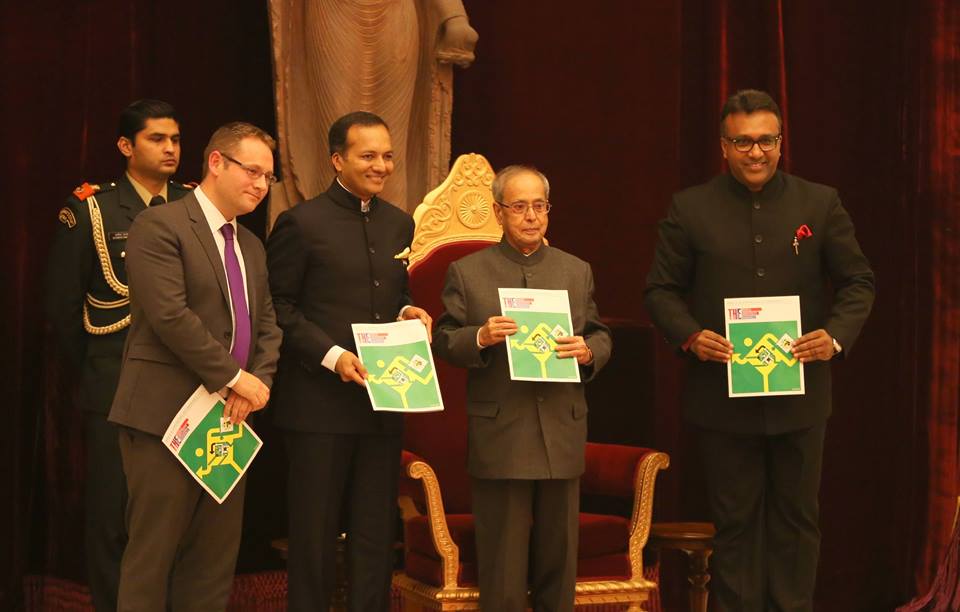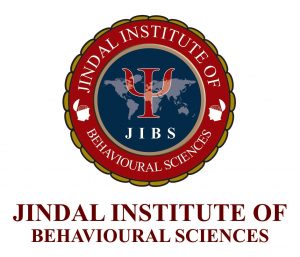New Delhi, Delhi, India:
- Rashtrapati Bhawan Reception kicked -off key three-day event organized by O.P. Jindal Global University
- The Times Higher Education BRICS & Emerging Economies Rankings, 2016 presented to President
- President Pranab Mukherjee calls for world-class Indian universities
The three-day long “Times Higher Education BRICS Emerging Economies Universities Summit 2015” commenced with an address by the President of India, Shri Pranab Mukherjee on 2nd December hosted at the Durbar Hall, President House, New Delhi.
Speaking on the occasion, the President said that in today’s era of globalization, which rests on the pillars of Collaboration, Cooperation and Communication, there are ample opportunities to use these “3Cs” to create many world class universities. The combined strength of the five BRICS nations can develop an educational eco-system for their citizens as well as for the world citizens. He expressed hope that the Summit will come out with innovative solutions, with the cooperation of the private sector, for the emerging economies to further strengthen their higher education system and in the process emerge as leaders.
The President said that the quality of education has a direct co-relation with inclusive growth and development. Emerging economies facing the challenge of meeting the developmental aspirations of their citizens must build an educational system comparable to the best in the world. A world class university in today’s time is one that can address the global problems of society having the entire world as its constituency.
The President said that to meet bench-marks, institutions need to provide greater emphasis on quality research that is recognized globally. This would help in their efforts to become world-class. What is needed further is for such aspiring universities to reach out, communicate, exchange and encourage mobility of persons and ideas across the globe.
The international summit is being organised by Times Higher Education (THE), UK and the International Institute for Higher Education Research and Capacity Building (IIHEd), O. P. Jindal Global University.
The summit is planned from the 2nd to the 4th of December and is being hosted at the O.P. Jindal Global University Campus, Sonipat, Haryana. On this occasion the prestigious and much anticipated Times Higher Education BRICS & Emerging Economies Rankings, 2016 will be released , a copy of which was presented to the President of India at the reception hosted at his residence, the Rashtrapati Bhawan, New Delhi.
The summit will feature an exclusive first look at the 2016 THE BRICS & Emerging Economies Ranking results and Rankings Masterclass with Phil Baty, THE World University Rankings editor. Speaking ahead of the conference, Mr. Phil Baty, Editor at Large, Times Higher Education Magazine and Editor of the Times Higher Education World University Rankings, said, “We are extremely excited and this is a very special summit for us because what we are witnessing is the coming together of countries that are traditionally crowded out of the global rankings system. We believe this conference will help bring together some of the most exciting universities from developing economies in the correct context, to discuss their shared development issues, their shared concerns and enable them to share good practices.”
Mr. Naveen Jindal, Founding Chancellor O.P. Jindal Global University, said, “We feel immense pride and honor in having the President inaugurate this Summit. The BRICS Summit this year is being held at the OP Jindal Global University and this marks a great moment of inflexion for all the BRICS nations as well as the other emerging economies. The need of the hour is to impel higher education to ever greater heights and be seen as equals on the world academic stage. I am sure that the Times Higher Education Rankings, which are for the first time being declared and announced from India, will provide a strong stimulus for our policy makers and educationists to seriously consider how best and how soon we can bring India to the forefront in all fields of international excellence.”
The International Institute for Higher Education Research & Capacity Building (IIHEd) of O.P. Jindal Global University has partnered with Times Higher Education for the summit. Speaking about the partnership Prof. C Raj Kumar, Founding Vice Chancellor O.P. Jindal Global University and Director IIHEd said, “The International Institute for Higher Education Research & Capacity Building of O.P. Jindal Global university has collaborated with Times Higher Education to host this summit and we are sure that the learning that we garner will help the cause of providing quality higher education in India for future generations. The global academic summit will discuss and deliberate on the big issues of higher education, with a strong focus on globalisation and its implications for the governance of universities. International benchmarking for developing world-class universities as catalysts for social, economic and human development will be a theme that will run through the summit’s sessions.”
Other distinguished academicians who will be there at the International Summit include Professor (Dr.) Stephen P. Marks, François-Xavier Bagnoud Professor of Health and Human Rights, Harvard University, U.S.A.; Professor (Dr.) Jeffrey S. Lehman, Vice Chancellor, New York University, Shanghai, China and Mr. Phil Baty, Editor, Times Higher Education World University Rankings. Professor (Dr.) Ihron Rensburg, Vice Chancellor & Principal, University of Johannesburg, South Africa.
The summit is designed around the theme “Why Emerging Economies Need World Class Universities” and the panel discussions and breakout sessions are aimed to address the important and critical issues and challenges affecting higher education in emerging economies. These will include ‘The role of information and communication technology in promoting innovation in universities’; ‘University governance and effective leadership for institution building’; ‘The role of international collaborations in promoting global excellence’; ‘Funding the future: How universities in emerging economies can diversify their income’; and, ‘Changing university culture to increase research productivity and visibility’.



